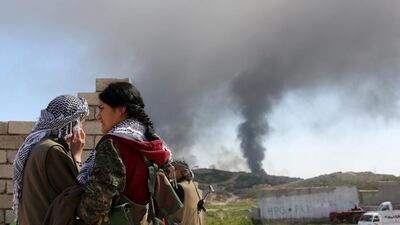There are few constants in Turkish politics these days but one thing is clear, president Recep Tayyip Erdogan does not want his AK Party (AKP) to be in a coalition government. After two months of talks, a historic opportunity to build a unity government in Ankara has all but disappeared. How this came to pass – after the AKP failed to obtain a simple majority in June’s parliamentary elections – is a story of deceptive politics and fear mongering.
Mr Erdogan sailed to an easy victory in the country’s first direct presidential election last year and quickly set his sights on Turkey’s parliament as a vehicle to entrench his power. With an AKP supermajority in the parliament, the constitution could be rewritten to transform Turkey into a presidential system. Regardless of the war in Syria or Turkey’s declining economy, the AKP has focused on this facile power play by carefully removing and confronting any political obstacles that stand in the way, including serious graft allegations.
Playing politics is full of unintended consequences even for a consummate politician like Mr Erdogan. Years of increasing AKP authoritarianism coupled with a sagging Turkish economy created fertile ground for an unlikely challenger to the president’s grand plans: the Kurds. More specifically, the pro-Kurdish People’s Democratic Party (HDP).
In last year’s municipal elections, the HDP won a remarkable 9.7 per cent of the popular vote, reflecting an increasingly assertive political drive by Kurds inside Turkey buoyed by the 2013 ceasefire between the outlawed militant group, the Kurdistan Workers’ Party (PKK), and the state. While the HDP was unable to secure a ruling majority in June’s parliamentary elections, it did win a surprising 13 per cent of the general vote.
As such, Mr Erdogan’s grand plans for a supermajority were foiled, at least for the time being. Almost immediately, the AKP sent signals to the Turkish people that it would be seeking early elections despite “good faith” coalition negotiations.
Then, in July, ISIL militants carried out a horrific suicide bombing in the southern Turkish city of Suruc, killing more than 30 people and forcing a reaction from Ankara. Turkey moved swiftly against a handful of ISIL targets. But the real brunt of Turkish force was reserved for PKK strongholds in Turkey and Iraq. The ceasefire between the PKK and the Turkish government was over and everyone should have seen its end coming for months.
A simple review of the past several months of statements from the PKK reveals clear signals that the Turkish military was advancing and even provoking the militant Kurdish group by applying pressure to PKK security outposts and checkpoints.
By upgrading Turkey’s role in the international fight in Syria against ISIL, Mr Erdogan was essentially free to pursue the PKK without major backlash. Many countries have a scapegoat or an old foe that the state can rally against to boost morale, divert attention or rally nationalist sentiment. The PKK played this part for the AKP. Moreover, since the outbreak of civil war in Syria, Ankara has become rightly concerned that the Kurds will declare their own state in an area around northern Syria and Iraq.
Regardless of the aggression towards the PKK, the international coalition fighting ISIL immediately welcomed the Turkish decision to become more involved. Along with air raids, Ankara finally opened the Incirlik airbase to coalition aircraft. Within easy striking distance of key ISIL targets in northern Syria, the airbase could change the way the anti-ISIL campaign is carried out.
Ultimately, the outbreak of fighting against the Kurds and the demise of the ceasefire has provided Mr Erdogan with a device that could kill many birds at one time. Air strikes on PKK targets have engendered attacks from PKK militants in the form of suicide bombs in Istanbul and raids on Turkish security forces throughout the country.
As a politician who considers himself the supreme protector of security, in the same vein that Mustafa Kemal Ataturk once did, Mr Erdogan has embraced the position of being a national guardian in a time of war. His populist rhetoric has long been predicated on a dichotomy of “us” (his conservative Muslim supporters across the country) and “them” (Kurds, leftists, journalists and many in the international community who speak out against growing authoritarianism).
Renewed fighting with the PKK gives this dichotomy new life and political currency. According to some opinion polls, the AKP’s popularity has risen since this latest round of violence. And this week, all of the parties involved in the coalition talks have more or less accepted failure.
Responding to criticism from opposition parties that he is directly interfering in politics in order to gain a supermajority in the parliament, Mr Erdogan said: “You can either accept it or not. Turkey’s governmental system has been de facto changed ... What should be done now is to finalise the legal framework of this de facto situation with a new constitution.”
The question remains whether Mr Erdogan or anyone in the AKP can put a lid on the violence that is sweeping the country. Turkey is in a fragile position at a critical time. The country occupies a pivotal role in the fight against ISIL and as such, the anti-ISIL coalition must continue to push Turkey towards active engagement against the militant group in Syria and Iraq.
Ultimately, politics is a nasty business and the Kurds have long received the short end of the stick. This will continue as the international community allows Turkey to play out its war in order to keep Ankara engaged in the much larger battle against ISIL.
jdana@thenational.ae
On Twitter: @ibnezra

